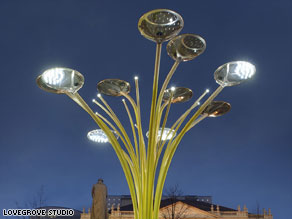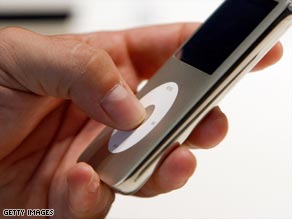For CNN
LONDON, England (CNN) -- Taking inspiration from nature, designer Ross Lovegrove has brought beauty to an everyday object that few give a passing thought to: the streetlamp.

Ross Lovegrove's 'Solar Tree' at night. The second generation tree will be fully automated and able to follow the sun.
The energy intensive lamps are quite literally, and figuratively, getting a green makeover and may be sprouting on a street near you soon.
Lovegrove's innovative lighting project, the "Solar Tree," is a solar-powered streetlamp that also serves as a piece of modern art, infusing a bit of nature into the usually gray urban landscape.
He believes that putting complex natural forms in a city can benefit all of society.
The "Solar Tree" has a striking green trunk and ten branches with solar panels that radiate light on the street below.
"The light looks pretty good when it's off. Most of the other lights out there have no life in them when they are off. I've seen more life in an old guy sleeping on a park bench then I have in some of those other streetlamps," Lovegrove told CNN.
The lamps were first planted, to much acclaim, on the Ringstrasse in Vienna in October 2007 in collaboration with MAK, the Museum of Applied Arts.







